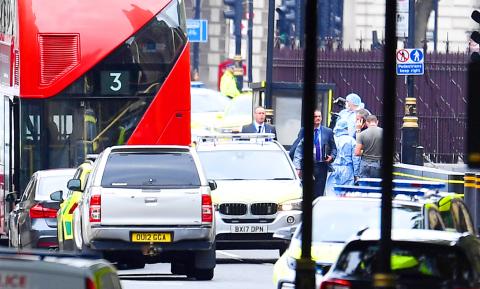A motorist yesterday slammed into pedestrians and cyclists near Britain’s Houses of Parliament and police are treating the incident as an act of terror.
A man in his 20s was arrested on suspicion of terrorist offenses after the silver Ford Fiesta collided with rush-hour commuters before slamming into a barrier.
Two people were hurt, but authorities said none of the injuries is life-threatening.

Photo: EPA-EFE
Armed police swooped into the area, cordoning off streets surrounding the heart of Britain’s government. Police appealed to the public to stay away, and the Westminster subway station was closed.
Several eyewitnesses said the driver’s actions were deliberate.
“The car drove at speed into the barriers outside the House of Lords. There was a loud bang from the collision and a bit of smoke,” Ewelina Ochab told The Associated Press.
“The driver did not get out. The guards started screaming to people to move away,” Ochab added.
Jason Williams also saw a car moving at high speed.
“It looked deliberate. It didn’t look like an accident,” he said. “How do you do that by accident? It was a loud bang.”
The incident heightened tensions in a city that has seen four vehicle-based terror attacks in less than 18 months.
The area was the site of a terror attack in March last year, when Khalid Masood ploughed a car into crowds on Westminster Bridge, killing four people and injuring more than 50.
Masood abandoned his car and then stabbed and killed a police officer before being shot dead in a courtyard outside Parliament.

ELECTION DISTRACTION? When attention shifted away from the fight against the militants to politics, losses and setbacks in the battlefield increased, an analyst said Recent clashes in Somalia’s semi-autonomous Jubaland region are alarming experts, exposing cracks in the country’s federal system and creating an opening for militant group al-Shabaab to gain ground. Following years of conflict, Somalia is a loose federation of five semi-autonomous member states — Puntland, Jubaland, Galmudug, Hirshabelle and South West — that maintain often fractious relations with the central government in the capital, Mogadishu. However, ahead of elections next year, Somalia has sought to assert control over its member states, which security analysts said has created gaps for al-Shabaab infiltration. Last week, two Somalian soldiers were killed in clashes between pro-government forces and

Ten cheetah cubs held in captivity since birth and destined for international wildlife trade markets have been rescued in Somaliland, a breakaway region of Somalia. They were all in stable condition despite all of them having been undernourished and limping due to being tied in captivity for months, said Laurie Marker, founder of the Cheetah Conservation Fund, which is caring for the cubs. One eight-month-old cub was unable to walk after been tied up for six months, while a five-month-old was “very malnourished [a bag of bones], with sores all over her body and full of botfly maggots which are under the

BRUSHED OFF: An ambassador to Australia previously said that Beijing does not see a reason to apologize for its naval exercises and military maneuvers in international areas China set off alarm bells in New Zealand when it dispatched powerful warships on unprecedented missions in the South Pacific without explanation, military documents showed. Beijing has spent years expanding its reach in the southern Pacific Ocean, courting island nations with new hospitals, freshly paved roads and generous offers of climate aid. However, these diplomatic efforts have increasingly been accompanied by more overt displays of military power. Three Chinese warships sailed the Tasman Sea between Australia and New Zealand in February, the first time such a task group had been sighted in those waters. “We have never seen vessels with this capability

‘NO INTEGRITY’: The chief judge expressed concern over how the sentence would be perceived given that military detention is believed to be easier than civilian prison A military court yesterday sentenced a New Zealand soldier to two years’ detention for attempting to spy for a foreign power. The soldier, whose name has been suppressed, admitted to attempted espionage, accessing a computer system for a dishonest purpose and knowingly possessing an objectionable publication. He was ordered into military detention at Burnham Military Camp near Christchurch and would be dismissed from the New Zealand Defence Force at the end of his sentence. His admission and its acceptance by the court marked the first spying conviction in New Zealand’s history. The soldier would be paid at half his previous rate until his dismissal